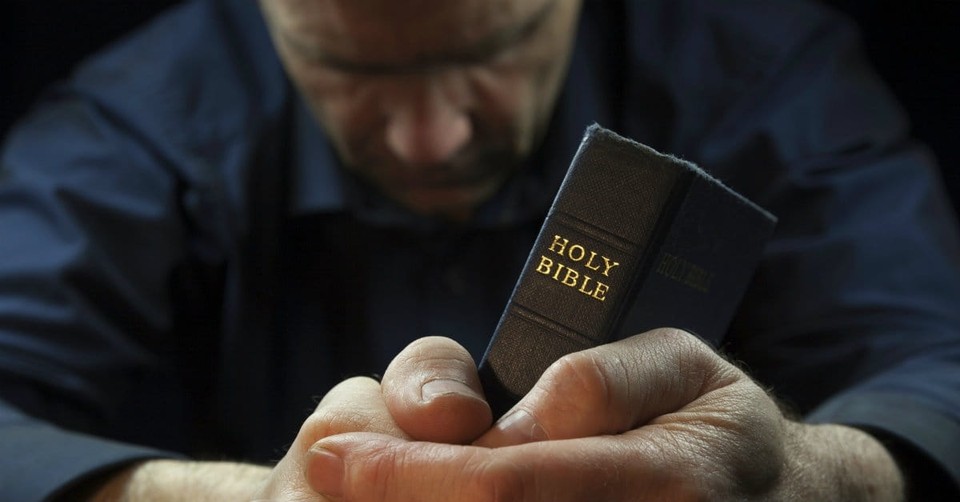My Doubts Are Destroying My Faith!

Editor's Note: Pastor Roger Barrier's "Ask Roger" column regularly appears at Preach It, Teach It. Every week at Crosswalk, Dr. Barrier puts nearly 40 years of experience in the pastorate to work answering questions of doctrine or practice for laypeople, or giving advice on church leadership issues. Email him your questions at roger@preachitteachit.org.
Dear Roger,
I’m finding that believing in the validity of Christianity is becoming more difficult.
How could a loving God allow so much suffering? With thousands of religions spanning the globe who are we to say, or for Jesus to say, that he is the only one who can help us find God? It just doesn’t make sense.
How could God send people to hell who’ve never had a chance to hear about Christ?
How can we believe that the six-day creation as recorded in Genesis One could ever be literally true? How are we supposed to trust in the Bible when it has demonstrable conflicts and errors?
I see some reasons why the fight surrounding gay marriage is worth the struggle. But what bothers me is that gays and lesbians actually have anatomic, structural brain differences from heterosexuals.
I’m asking questions that I’ve never asked before and the answers and non-answers are really bothering me. I’m not even sure exactly what I’m asking from you except that I’m really struggling with my doubts and miserable in the process. My anchor is slipping and the boat is drifting, do you see what I mean?
Please help me, Randy
Dear Randy,
Move over; I need a seat in your boat. We are fellow travelers looking for security and answers.
My faith struggles began in my early 20s. I’ll be vulnerable and say that I’ve struggled with doubts ever since.
I’ll not take time to reiterate my struggles with doubts — but I will share with you the truths that I turn to for peace when my faith is shaking. By the way, in Psalm 73, Asaph had his doubts about the goodness of God. Far from disqualifying him to lead worship, God gave him lots of grace. He told him to keep his own doubts quiet so as not to disturb the congregation. Then, God gave him the understanding and the time to work through his issues.
I continued sharing the Word of God even while I was doubting because the Word of God is powerful and life-changing. I continued pastoring because God gave me the grace and time that I needed to seek insight for answers to my questions.
1. Doubts concerning Jesus Christ are normal.
I once asked a pastor friend, “Do you ever have doubts?” He cocked his head and said, “Well, of course. Doesn’t everybody?”
We don’t talk much about our doubts in the Christian church. We talk about faith. Doubt is an “off-limits” subject. It is like we are stained, or a traitor to the cause, if we admit to doubt.
Think about John the Baptist. He was the forerunner of Jesus. But when depressed and imprisoned, his faith wavered. He sent his disciples to ask Jesus, “Are you really the one, or should we look for another?” (Luke 7:18-23).
Jesus did not say, “Yes,” and settle the issue for John once and for all. He told him to look at His works: “Tell John that blind eyes see; paralyzed limbs are restored; deaf ears here; and demons are exorcised.”
The opposite of faith is not doubt. The opposite of faith is no faith. A faith-doubt crisis is not the same as no faith at all.
I do know some who claim never to have had a single doubt about the Bible and the Lord Jesus Christ. In some ways that’s an easy faith.
I know many who have struggled to believe — and in the solution to their struggle they found their faith stronger than ever.
Struggles with face and doubts are normal Christianity. We come out the other side stronger than ever
2. Doubts often arise when we are disappointed with Jesus.
Why Did John the Baptist begin to doubt? Because Jesus did not live up to his expectations.
Judas was disappointed with Jesus and look where it got him.
Many people have expectations for Jesus that He has no intentions of meeting. Their prayers are not in line with his will. Or, secret sins impair their requests.
Some people are disappointed about: children, jobs, sickness, finances, marriage etc.— He’s not providing the love and care they expected, and so they turn somewhere else to find help.
3. Jesus never criticizes up or scolds us for struggling with doubt. He’s pulling for us to find victory.
When the storm increased and the sea was entering the boat, Jesus was asleep back aft. The disciples awoke him and pleaded with him to save them. Jesus responded, “Oh, little faiths, where’s your faith?” This was not a rebuke. The term “little faiths” is viewed in the Greek language as a term of endearment.
Jesus has a vested interest in helping those who doubt to find faith.
That is what He did with me. Jesus did not brand me a heretic. He did not take away my ministry. He refused to punish me for having doubts; instead, He took steps gently to increase my faith. He was kind to me. I never once had the impression that He was angry with my unbelief—disappointed perhaps—but not irate. Never once did I feel betrayed or deserted.
I’ll share with you what I call my “Faith Anchors:”
First, I decided that God may well be doing things about which I knew nothing. This is a matter of humility and good sense.
The Bible makes it clear that God has mysteries that he has no intention of sharing with us in this life.
This makes me think of Job. For 42 chapters, Job tried to get answers from God about what was going on in his life. Near the end of the book, God seemed to get tired with Job for asking the same questions again and again. He rebukes him harshly: “Who in the world do you think you are that you dare to question me!?”
God then proceeds to challenge Job: “If you think you’re so smart then answer these questions.” God then asks Job questions about everything from the stars in the sky to the sea monsters in the ocean. Job scores “zero” on his tests.
I decided that it takes a lot of pride and arrogance to falter in faith when God does not acquiesce to answer our questions. By the way, when the book of Job ends God has not answered a single one of Job’s questions.
Second, God actually gave me a sign to validate His reality.
I often prayed to see God’s glory which in revealed as light. I prayed that someday in church I would be like Isaiah and see God high and mighty and lifted up in glory.
One Sunday morning as I was preaching, God answered that prayer. A teenage boy shined a powerful flashlight in my eyes--so powerful that the light shut down my irises and I couldn’t see my notes. I told him to turn off the light, and he did.
Ten minutes later he shined it again. “Turn off the light!” And he did. Ten minutes later he shined it once more. I remember pointing him and saying with anger, “Turn it off, I can’t see.” And he did.
Immediately after the service I hurry down the aisle and confronted him about the flashlight, and he said, “I don’t have a flashlight.” I asked to frisk him and he lifted his arms. There was no flashlight. I looked under the pew and around his seat but there was no flashlight. I was so embarrassed.
It took me six months to realize that God had answered my prayers. He had given me a glimpse of his glory and all I could think of was a flashlight.
On the same weekend, six months later, God also answered some the salvation prayers of that young man which tied in with the flashlight. But that’s another story.
Jesus says that He seldom sends signs to bolster belief. Don’t expect one; however, if God gives one then be humbled, don’t doubt, and never get over it.
Third, I chose to place my faith in the resurrection.
I was taking a gamble but I liked the odds.
I could not figure out all of my questions regarding the cosmos and quantum mechanics; however, I figured that by using the gospel stories, I could prove the facts of the resurrection.
With the precautions the Romans took with the size of the stone, with the seal, and with the Roman guard there is no doubt that Jesus was placed in a sealed tomb.
Because of the way the grave clothes were laying when Peter and John looked in the tomb, I conclude that Christ no doubt was resurrected and transitioned in spiritual form to depart his grave. He resurrected right out of his burial clothes. I decided to put my face in his promise that he cheated death and that by believing in him, I could one day cheat death, too.
Fourth, I missed the times we spent together.
Over the years, I felt that Jesus and I had developed a relationship of close intimacy. My doubts were trashing our relationship and cutting Him out of my life. After a while I simply missed him and the times we’d had together.
I missed the strength and the comfort that I received from him. “Let not your heart be troubled.” “I can do all things through Christ who strengthens me.” “My grace is sufficient for you.” “Consider the lilies.” I was tired of being stymied by my doubts and unanswered questions.
I decided to forgo the questions and uncertainties and return to the delight of experiencing life with him. This was a conscious choice. Spending time in his presence meant more to me than solving a host of unanswered questions.
Fifth, at some point, every doubter must make a personal decision to have faith -- or not.
Faith is a cold-blooded decision to say “yes” to the things of our Lord Jesus Christ. No one else can make this decision for us. No one ever had faith without making this decision.
Sixth, I decided that it was time to stop fighting.
Fighting for answers was making me miserable. The closer you get to mortality and realize that time is running out, the more you realize that it’s stupid to throw away a lifetime of living with Christ.
When I was younger I couldn’t bring myself to stop looking for answers to the unanswerable. But there comes a time to stop fighting and enjoy the cruise.
Polycarp was a pupil of the apostle John who lived from 70 to 155 A.D. He bridged the gap between the Biblical apostles and the early church fathers. Polycarp wrote numerous letters to the church at Philippi encouraging the members to remain strong in their faith and to flee materialism. Polycarp served as the bishop of the church at Smyrna.
Polycarp's greatest contribution to Christianity may be his well-documented martyrdom. During a time of intense persecution Polycarp was arrested on the charge of being a Christian. Christianity was viewed as a politically dangerous cult whose rapid growth needed to be stopped. Amidst an angry mob, the Roman proconsul took pity on the gentle old man and urged Polycarp to proclaim, "Caesar is Lord.” Then, he would let him go free. Polycarp responded, "Eighty-six years I have served Christ, and He never did me any wrong. How can I blaspheme my King who saved me?" He was burned alive at the stake.
Personally, I committed my life to Christ when I was seven. I love Him and He loves me. Frankly, all of my questions and doubts don’t come close to topping the investment that I have in him--and that he has made in me. I have too much at stake to turn my back on Him now.
Sincerely,
Roger

Originally published May 28, 2019.







